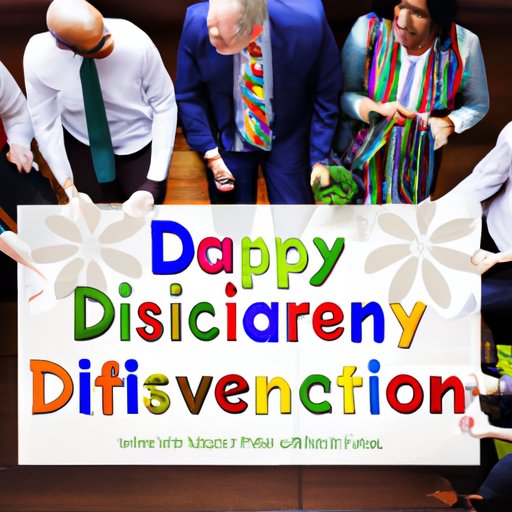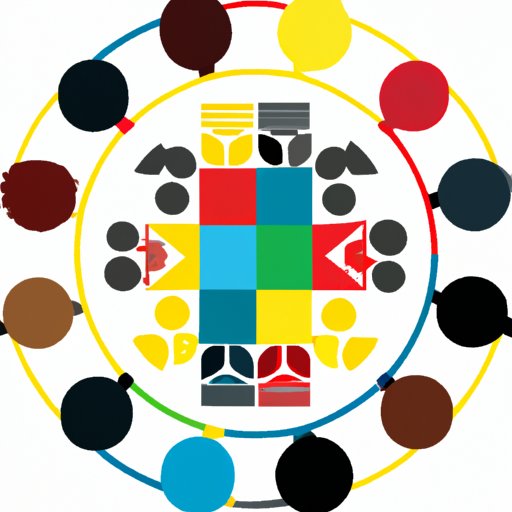Introduction
Cultural competence is a set of attitudes, behaviors, and skills necessary for successful interaction with people from different cultures. It involves understanding one’s own cultural identity and the cultural identities of others, as well as developing the capacity to interact effectively across cultures. In the workplace, having cultural competence can lead to better collaboration, increased job satisfaction, and improved productivity.
However, achieving cultural competence in the workplace can be challenging. It requires an open-minded attitude, as well as an understanding of the challenges that come with working in a culturally diverse environment. Fortunately, there are several strategies employers can use to foster greater cultural competence among their employees.
Encourage Employees to Take Part in Cultural Competency Training
One of the best ways to improve cultural competence in the workplace is to provide cultural competency training for employees. This type of training helps employees understand how cultural differences can affect communication, interactions, and decision-making. It also teaches them how to recognize and respect different cultural values and perspectives.
There are several types of cultural competency training available. For example, organizations can offer workshops, seminars, and online courses. They can also provide experiential learning opportunities, such as field trips or simulations. Additionally, some organizations may choose to hire a consultant to provide customized cultural competency training.
To encourage employees to take part in cultural competency training, organizations should create an atmosphere that values and rewards learning. They should also provide incentives, such as recognition or special privileges, for those who participate in the training. Finally, they should ensure that the training is convenient and accessible, so employees are able to attend without difficulty.

Promote Respectful Dialogue and Open Communication Across Cultures
Respectful dialogue and open communication are essential for fostering a positive, productive workplace environment. When employees feel comfortable expressing their opinions and ideas, they are more likely to collaborate effectively with colleagues from different backgrounds.
Organizations can promote respectful dialogue and open communication by encouraging employees to share their thoughts and experiences. They should also ensure that everyone has the opportunity to be heard and respected. Additionally, organizations should provide conflict resolution resources and training, so employees can resolve disagreements in a constructive manner.
Finally, organizations should strive to create a safe space where employees can discuss issues related to culture and identity. This can help employees gain a better understanding of each other and build trust within the workplace.

Foster an Inclusive Workplace Environment
Creating an inclusive workplace environment is key to improving cultural competence. An inclusive workplace is one in which all employees feel valued, respected, and supported regardless of their background or identity. It encourages employees to be open-minded and tolerant of differences.
Organizations can foster an inclusive workplace environment by developing policies and procedures that promote fairness and equality. They should also provide diversity and inclusion training for employees, so they can learn how to recognize and address bias. Additionally, organizations should ensure that everyone has access to the same resources and opportunities, regardless of their background.
Organizations should also strive to create a sense of belonging among all employees. This can be done by recognizing and celebrating the contributions of employees from different backgrounds, as well as hosting events that bring people together.
Utilize Cultural Mentorship Programs
Cultural mentorship programs can be a great way to improve cultural competence in the workplace. These programs pair employees from different backgrounds, allowing them to learn about each other’s cultures and work together to solve problems. By engaging in meaningful conversations, mentees can gain insight into different perspectives and broaden their worldview.
There are several types of cultural mentorship programs available. Organizations can offer formal programs, in which mentors and mentees meet regularly over a period of time. They can also offer informal programs, in which mentors and mentees meet informally on an as-needed basis. Additionally, organizations can offer virtual mentorship programs, which allow mentors and mentees to connect remotely.
To maximize the effectiveness of cultural mentorship programs, organizations should ensure that mentors and mentees have compatible interests and goals. They should also provide resources and support for the program, such as guidelines and training materials. Finally, they should create an environment that encourages open dialogue and honest feedback.

Celebrate Diversity in the Workplace
Celebrating diversity in the workplace is another important strategy for improving cultural competence. Celebrating diversity helps create an atmosphere of respect and appreciation for different cultures, which can lead to increased collaboration and productivity.
Organizations can celebrate diversity in a variety of ways. They can host events that recognize different cultures, such as potlucks featuring international cuisine or cultural festivals. They can also recognize employees from different backgrounds during meetings or company gatherings. Additionally, organizations can create initiatives that promote diversity, such as employee resource groups.
Organizations should also strive to create a workplace culture that celebrates diversity every day, not just on special occasions. This can be done by ensuring that everyone has equal access to opportunities, recognizing and rewarding employees from different backgrounds, and encouraging employees to be open-minded and tolerant of differences.
Create Cross-Cultural Teams for Collaborative Projects
Creating cross-cultural teams for collaborative projects can be another effective strategy for improving cultural competence. Working with colleagues from different backgrounds can give employees the opportunity to learn about different cultures and develop their cross-cultural communication skills.
When creating cross-cultural teams, organizations should ensure that team members have complementary skills and abilities. They should also provide resources and guidance to help team members work together effectively. Additionally, organizations should ensure that team members have access to the same resources and opportunities.
Organizations should also strive to create an environment that encourages collaboration and respect. This can be done by providing team building activities and workshops, as well as recognizing and rewarding team members for their efforts.
Conclusion
Cultural competence is an important skill in the workplace, and organizations should strive to foster it among their employees. There are several strategies employers can use to improve cultural competence, such as providing cultural competency training, promoting respectful dialogue and open communication, fostering an inclusive workplace environment, utilizing cultural mentorship programs, celebrating diversity, and creating cross-cultural teams for collaborative projects.
By implementing these strategies, organizations can create a workplace that is more accepting of differences and better equipped to handle the challenges of a culturally diverse environment. This can lead to increased collaboration, job satisfaction, and productivity.
(Note: Is this article not meeting your expectations? Do you have knowledge or insights to share? Unlock new opportunities and expand your reach by joining our authors team. Click Registration to join us and share your expertise with our readers.)
